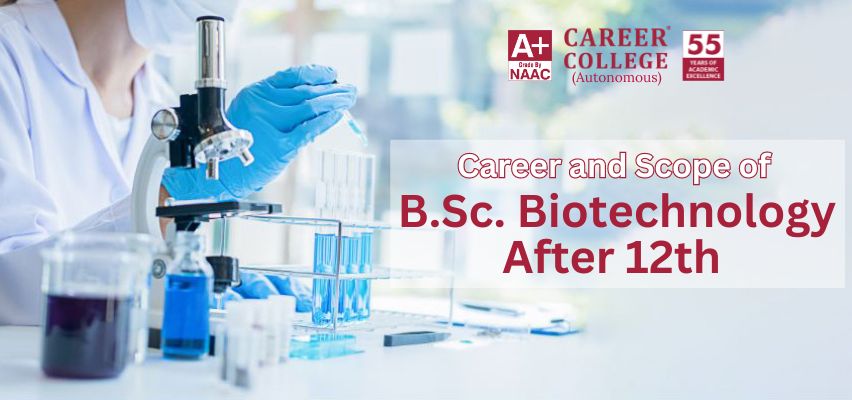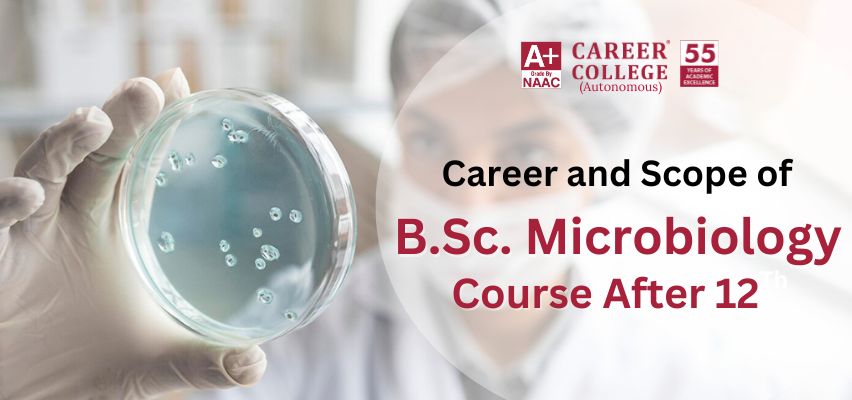Table of Contents
ToggleBiotechnology, where science meets progress for a brighter future, is a fast-expanding discipline that combines biology with technology. After graduating from high school, pursuing a BSc in Biotechnology opens the door to a world of innovation and opportunities. This blog delves into what a B Scin Biotechnology comprises, the scope and opportunities it provides, and why it might be the best fit for your undergraduate education.
What is BSc Biotechnology?
BSc in Biotechnology is an undergraduate course that generally takes three to four years, depending upon the education policies of the concerned institute. This global course applies biological and technological concepts to the development of new goods and solutions for a variety of industries, including healthcare, agriculture, environmental management, etc.
Why BSc Biotechnology is important?
- BSc Biotechnology equips students with interdisciplinary skills merging biology, and technology, essential for addressing complex global challenges.
- It fosters innovation in healthcare, agriculture, industry, and environmental conservation through genetic engineering, bioprocessing, and bioinformatics.
- It promotes personalized medicine, sustainable agriculture, and renewable energy solutions crucial for a healthier and greener future.
- Graduates play pivotal roles in the research, development, and commercialization of biotechnological advancements, driving economic growth and societal well-being.
- With its focus on ethical considerations and responsible innovation, BSc Biotechnology ensures the sustainable and equitable deployment of biotechnological solutions.
- BSc Biotechnology fosters critical thinking and problem-solving skills necessary for tackling emerging biological and environmental challenges.
- It cultivates a deep understanding of molecular mechanisms, enabling advancements in disease diagnosis, treatment, and prevention.
- Graduates contribute to global food security by developing drought-resistant crops, biofortified foods, and sustainable agricultural practices.
- Studies in biotechnology empower individuals to make informed decisions about the ethical, social, and regulatory implications of biotechnological innovations.
- Through hands-on laboratory experience and research projects, students develop practical skills and scientific literacy essential for careers in academia, industry, and healthcare.
BSc Biotechnology Course Details [Duration & Eligibility]
- Course Duration: 3 Years
- Course Eligibility: 10+2 with Biology.
Subjects in BSc Biotechnology
The curriculum for a BSc in Biotechnology is meticulously crafted to offer students a comprehensive understanding of the theoretical concepts and hands-on applications within the field of biotechnology. Through a blend of academic coursework and practical laboratory experiences, students delve into various facets of biotechnology, ranging from molecular biology and genetics to bioinformatics and industrial bioprocessing.
In this program, students explore the intricacies of biological systems and learn to apply cutting-edge technologies to solve real-world challenges in healthcare, agriculture, environmental conservation, and beyond. They gain proficiency in experimental techniques, data analysis methods, and critical thinking skills essential for conducting research and innovation in biotechnology.
The key subjects covered in the curriculum include, but are not limited to:
- Molecular Biology: Understanding the fundamental processes governing the structure, function, and regulation of biological macromolecules such as DNA, RNA, and proteins.
- Genetics and Genomics: Exploring the principles of inheritance, gene expression, genetic engineering, and the analysis of genomes for various applications in biotechnology.
- Biochemistry: Examining the biochemical pathways and metabolic processes underlying cellular functions, with a focus on their relevance to biotechnological applications.
- Bioprocess Engineering: Learning about the design, optimization, and scale-up of bioproduction processes for the manufacturing of biopharmaceuticals, enzymes, and other bioproducts.
- Biostatistics and Bioinformatics: Acquiring skills in statistical analysis and computational methods for processing and interpreting biological data, including genomic sequences and high-throughput omics data.
- Microbiology and Microbial Biotechnology: Investigating the diversity, physiology, and genetic manipulation of microorganisms for industrial, environmental, and medical purposes.
- Cell Culture and Tissue Engineering: Mastering techniques for culturing and manipulating cells in vitro, as well as exploring the principles of tissue engineering for regenerative medicine applications.
- Biotechnology Ethics and Regulations: Considering the ethical, legal, and societal implications of biotechnological advancements, as well as understanding the regulatory frameworks governing the development and commercialization of biotechnological products.
Overall, the BSc in Biotechnology curriculum equips students with a multifaceted skill set and knowledge base, preparing them for diverse career pathways in research, academia, healthcare, agriculture, and biotechnology industry sectors.
Higher Education and Specialization after BSc Biotechnology
- After BSc in biotechnology, which course is best
- Many students pursue higher education after completing their BSc in Biotechnology.
- Advanced degrees such as M.Sc. (Master of Science) and PhD (Doctor of Philosophy) in Biotechnology or related fields offer deeper knowledge and specialization.
- These advanced degrees provide better career opportunities.
- Specialized fields in biotechnology :
- Genetic engineering
- Molecular biology
- Bioinformatics
- Industrial biotechnology
- Biofuels and Bioenergy
- Biosensors and diagnostics
- Stem cell biotechnology
- Medical Biotechnology
- Bioethics and policy
- Microbial Biotechnology
- Agriculture Biotechnology
- Industrial Biotechnology
- Environmental Biotechnology
- Food Biotechnology
- Pharmaceutical Biotechnology
- Nanobiotechnology
- Animal Biotechnology
- Aquaculture Biotechnology
BSc in Biotechnology: Eligibility and Essential Skills
Anyone from a biology background can apply for a BSc in Biotechnology degree. The skills you may learn while pursuing a BSc in biotechnology include analytical thinking, problem-solving accuracy, laboratory skills, etc.
Career Opportunities [Jobs after BSc Biotechnology]
A BSc in Biotechnology has a vast scope, which could include the following:
- Higher Education (M.Sc/M.Tech)
- Industry Career
- Government and Regulatory agencies like the FDA, EPA, CDC, etc.
- Entrepreneurship and startups
- Bioprocess technician
- IP Analyst
- NGOs
- QA/QC as technicians
- Bioinformatics analyst
- Medical Sales and Marketing
The best college in Bhopal for BSc Biotechnology?
- The best college in Bhopal for pursuing a BSc in Biotechnology is Career College Bhopal. due to its Best Academic Record, Best Placement, Experienced Faculty, and Alumni Network.
Why Choose Career College Bhopal?
Experienced faculties, research ecosystem, interdisciplinary curriculum, collaborations with industries and research institutes, opportunities for student involvement in research projects, career counseling, professional development, hands-on practical experience, etc.
- Training and Placement Opportunities:
- Specialized Placement and Training Cell for National and International Students.
- Tie to top companies both domestically and internationally.
- Provides the best placement opportunities for a secure beginning to professional careers.
- Modern Facilities and Collaborations:
- Working in partnership with the National Skill Development Corporation (NSDC).
- IIT Delhi’s Virtual Lab is a modern facility.
- IIT Madras is the local chapter of Swayam NPTEL.
- IIT Bombay’s Super Resource Center for the Spoken Tutorial Project.
- Holistic Development:
- Beyond academic performance, focus on your entire personality development.
- Provides many training courses to improve general abilities.
- Our graduates have the confidence and skills necessary for success in the workplace.
- Includes leadership and communication skills training.
- Social and cultural values.
- 55 Years of Academic Excellence:
- Over the past 55 years, we have been at the forefront of the education sector.
- We provide top-notch guidance and support to our students.
- Our institution is renowned for assisting students in meeting their academic requirements.
- We foster a culture of innovation and continuous improvement in education.
- Our alumni network spans across various industries, showcasing the impact of our education on their careers.
- We prioritize student-centered learning and holistic development.
- Our faculty comprises experts and scholars dedicated to academic excellence.
- We offer state-of-the-art facilities and resources to enhance the learning experience.
- Our commitment to quality education is reflected in our accreditations and affiliations with leading institutions.
- We strive to create a conducive environment for intellectual growth and personal development.
- Socio-cultural Upliftment:
- Social and cultural activities.
- Offers a platform for students to showcase their skills and gain knowledge about many cultures.
- Improves skill development through various kinds of activities like hands-on workshops, seminars, webinars, expos, industrial visits, mentoring sessions, etc.
- Alumni Network:
- There is a large network of alumni who help current students with projects, internships, and jobs.
- A wide range of globally placed graduates from the United States, Australia, the United Kingdom, and Canada.
- Represents the college’s worldwide leadership.
- BIRAC E-YUVA:
- In 2021, the E-YUVA Center was established at Career College (Autonomous) in Bhopal.
- The Biotechnology Industry Research Assistance Council (BIRAC) has provided funding for the E-YUVA Center. Mumbai’s Riidl – Research Innovation Incubation Design Labs is the E-Yuva Center’s Bio NEST Partner.
- Well-equipped laboratory facilities and an environment for research and entrepreneurship are key features of our Biotechnology Department.
Prospective students and their guardians are encouraged to visit the Career College (Autonomous) campus or the college’s official website, https://careercollegeindia.com/, to learn more about the BSc Biotechnology program and admission details.
Conclusion
A BSc in Biotechnology may be a fulfilling choice to pursue after the 12th grade, with many opportunities for both career and personal development. Biotechnology is a vibrant and significant discipline that has the potential to shape a better future because it combines biology and technology. A career in biotechnology may be impactful and gratifying, regardless of your goals—whether you want to lead the way in scientific research or help solve world problems.
Join this fascinating adventure to be a part of the next wave of scientific innovation and discovery!
FAQ [Frequently Asked Questions]
- What is BSc Biotechnology?
Answer: The undergraduate curriculum of BSc Biotechnology integrates biology and technology to create innovative products and methods across industries such as environmental management, healthcare, and agriculture. Key subjects covered include molecular biology, genetics, microbiology, biochemistry, and bioinformatics.
- What are the eligibility criteria for enrolling in BSc Biotechnology?
Answer: Typically, the eligibility criteria include:
- Completion of a 10+2 or equivalent examination with Physics, Chemistry, and Biology as mandatory subjects.
- A minimum aggregate score of 50–60%.
- Some universities may require passing an entrance examination.
- What higher education opportunities are there after a BSc in biotechnology?
Answer: High education opportunities after BSc in Biotechnology:
- M.Sc. Biotechnology.
- M.Sc. Microbiology.
- M.Sc. Bioinformatics.
- M.B.A. in Biotechnology Management.
- PhD programs in various specializations.
- Which is the best college in Bhopal for BSc biotechnology?
Answer: There are many colleges in Bhopal offering BSc Biotechnology, but Career College (Autonomous) stands out as the best due to its strong curriculum, excellent faculty, and experienced and impressive placement records.
- Is there any BIRAC E-YUVA Center in Bhopal, Madhya Pradesh?
Answer: Yes, the E-YUVA Center was established at Career College, Bhopal, in the year 2021. The E-YUVA Center has been funded by the Biotechnology Industry Research Assistance Council (BIRAC).
- What is the full form of BIRAC?
Answer: Biotechnology Industry Research Assistance Council.




Very informative blog
thankyou ma’am